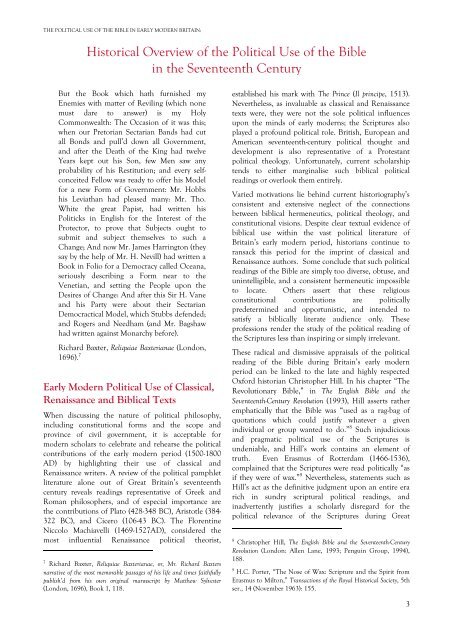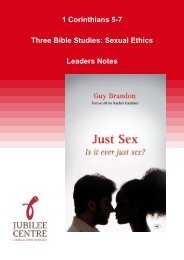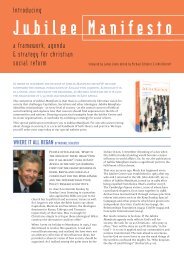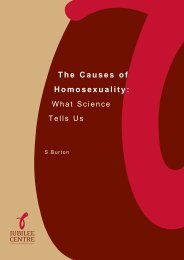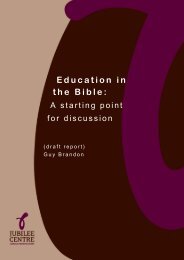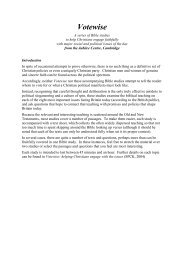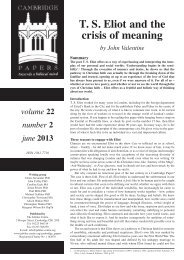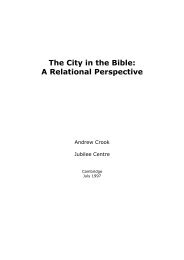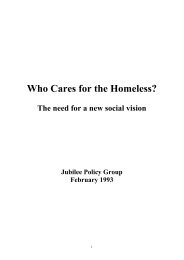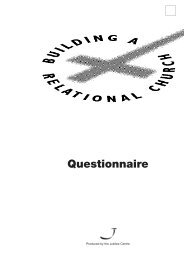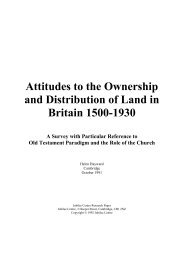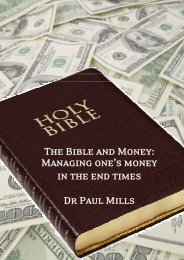Report Template - Jubilee Centre
Report Template - Jubilee Centre
Report Template - Jubilee Centre
You also want an ePaper? Increase the reach of your titles
YUMPU automatically turns print PDFs into web optimized ePapers that Google loves.
THE POLITICAL USE OF THE BIBLE IN EARLY MODERN BRITAIN:<br />
Historical Overview of the Political Use of the Bible<br />
in the Seventeenth Century<br />
But the Book which hath furnished my<br />
Enemies with matter of Reviling (which none<br />
must dare to answer) is my Holy<br />
Commonwealth: The Occasion of it was this;<br />
when our Pretorian Sectarian Bands had cut<br />
all Bonds and pull’d down all Government,<br />
and after the Death of the King had twelve<br />
Years kept out his Son, few Men saw any<br />
probability of his Restitution; and every selfconceited<br />
Fellow was ready to offer his Model<br />
for a new Form of Government: Mr. Hobbs<br />
his Leviathan had pleased many: Mr. Tho.<br />
White the great Papist, had written his<br />
Politicks in English for the Interest of the<br />
Protector, to prove that Subjects ought to<br />
submit and subject themselves to such a<br />
Change; And now Mr. James Harrington (they<br />
say by the help of Mr. H. Nevill) had written a<br />
Book in Folio for a Democracy called Oceana,<br />
seriously describing a Form near to the<br />
Venetian, and setting the People upon the<br />
Desires of Change: And after this Sir H. Vane<br />
and his Party were about their Sectarian<br />
Democractical Model, which Stubbs defended;<br />
and Rogers and Needham (and Mr. Bagshaw<br />
had written against Monarchy before).<br />
Richard Baxter, Reliquiae Baxterianae (London,<br />
1696). 7<br />
Early Modern Political Use of Classical,<br />
Renaissance and Biblical Texts<br />
When discussing the nature of political philosophy,<br />
including constitutional forms and the scope and<br />
province of civil government, it is acceptable for<br />
modern scholars to celebrate and rehearse the political<br />
contributions of the early modern period (1500-1800<br />
AD) by highlighting their use of classical and<br />
Renaissance writers. A review of the political pamphlet<br />
literature alone out of Great Britain’s seventeenth<br />
century reveals readings representative of Greek and<br />
Roman philosophers, and of especial importance are<br />
the contributions of Plato (428-348 BC), Aristotle (384-<br />
322 BC), and Cicero (106-43 BC). The Florentine<br />
Niccolo Machiavelli (1469-1527AD), considered the<br />
most influential Renaissance political theorist,<br />
7<br />
Richard Baxter, Reliquiae Baxterianae, or, Mr. Richard Baxters<br />
narrative of the most memorable passages of his life and times faithfully<br />
publish’d from his own original manuscript by Matthew Sylvester<br />
(London, 1696), Book 1, 118.<br />
established his mark with The Prince (Il principe, 1513).<br />
Nevertheless, as invaluable as classical and Renaissance<br />
texts were, they were not the sole political influences<br />
upon the minds of early moderns; the Scriptures also<br />
played a profound political role. British, European and<br />
American seventeenth-century political thought and<br />
development is also representative of a Protestant<br />
political theology. Unfortunately, current scholarship<br />
tends to either marginalise such biblical political<br />
readings or overlook them entirely.<br />
Varied motivations lie behind current historiography’s<br />
consistent and extensive neglect of the connections<br />
between biblical hermeneutics, political theology, and<br />
constitutional visions. Despite clear textual evidence of<br />
biblical use within the vast political literature of<br />
Britain’s early modern period, historians continue to<br />
ransack this period for the imprint of classical and<br />
Renaissance authors. Some conclude that such political<br />
readings of the Bible are simply too diverse, obtuse, and<br />
unintelligible, and a consistent hermeneutic impossible<br />
to locate. Others assert that these religious<br />
constitutional contributions are politically<br />
predetermined and opportunistic, and intended to<br />
satisfy a biblically literate audience only. These<br />
professions render the study of the political reading of<br />
the Scriptures less than inspiring or simply irrelevant.<br />
These radical and dismissive appraisals of the political<br />
reading of the Bible during Britain’s early modern<br />
period can be linked to the late and highly respected<br />
Oxford historian Christopher Hill. In his chapter “The<br />
Revolutionary Bible,” in The English Bible and the<br />
Seventeenth-Century Revolution (1993), Hill asserts rather<br />
emphatically that the Bible was “used as a rag-bag of<br />
quotations which could justify whatever a given<br />
individual or group wanted to do.” 8 Such injudicious<br />
and pragmatic political use of the Scriptures is<br />
undeniable, and Hill’s work contains an element of<br />
truth. Even Erasmus of Rotterdam (1466-1536),<br />
complained that the Scriptures were read politically “as<br />
if they were of wax.” 9 Nevertheless, statements such as<br />
Hill’s act as the definitive judgment upon an entire era<br />
rich in sundry scriptural political readings, and<br />
inadvertently justifies a scholarly disregard for the<br />
political relevance of the Scriptures during Great<br />
8<br />
Christopher Hill, The English Bible and the Seventeenth-Century<br />
Revolution (London: Allen Lane, 1993; Penguin Group, 1994),<br />
188.<br />
9<br />
H.C. Porter, “The Nose of Wax: Scripture and the Spirit from<br />
Erasmus to Milton,” Transactions of the Royal Historical Society, 5th<br />
ser., 14 (November 1963): 155.<br />
3


